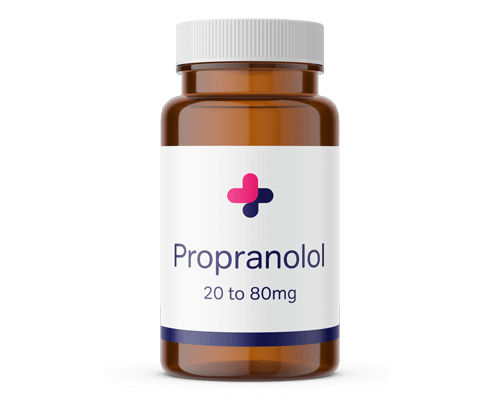Propranolol side effects
In addition to its wide-ranging benefits, Propranolol can also cause many unwanted side-effects, although not everyone will experience them. Such undesired effects may gradually subside as your body adjusts to the medication, however, if symptoms persist or worsen, seek your doctor’s advice immediately.
The most common side-effects include (affecting less than 1 in 10 people):
- Fatigue
- Dizziness
- Stomach cramps
- Constipation
- Cold hands or feet
- Disturbed sleep
- Slow heartbeat/ low blood pressure
Less common side-effects include:
- Impotence/reduced sexual desire
- Headaches
- Mood changes
- Shortness of breath/coughing
- Tightness of chest
- Yellow skin or whites of the eyes turning yellow
Precautions
Take caution not to break, chew, crush or open the Propranolol capsules before ingesting - this can cause potentially dangerous side effects. If the desired response is not obtained within four to six weeks after reaching the maximum dose, Propranolol should be discontinued. It is also advisable to withdraw the drug gradually over a period of several weeks rather than discontinuing abruptly as this can prompt chest pains and, in some instances, a heart attack.
Contraindications
Propranolol is not suitable for those with respiratory conditions such as asthma, bronchitis or emphysema. It should also be avoided by those who experience slow heartbeats, low blood pressure or any other heart conditions.
If you are scheduled for surgery where you will receive general anesthesia, you must inform your doctor and inquire how to manage your Propranolol dosing around the surgery.
Although Propranolol is not known to be harmful during pregnancy or while breastfeeding, it is not guaranteed. Therefore, it is always best to speak with your doctor about the potential benefits and risks associated with taking Propranolol and alternative medications that are better-suited for you.
While Propranolol enters the breast milk in small amounts, it is not enough to cause any harm to your baby. Having said this, it is important to inform your doctor if your baby was premature or suffers from any health problems.
Seek immediate medical attention if you experience any of the following symptoms as they could be indicative of an allergic reaction to Propranolol:
- Itching or peeling skin
- Difficulty breathing
- Swelling of the face, lips, throat or tongue
- Unusual bleeding
Drug Interactions
As certain medications may interfere with Propranolol, always tell your doctor about any you are currently taking, both prescribed and over-the-counter, including herbal or vitamin supplements.
Inform your doctor if you are taking medication for:
- High blood pressure
- Low blood pressure including for enlarged prostate glands or Parkinson’s disease
- Irregular heartbeats
- Asthma or chronic obstructive pulmonary disease
- Diabetes, particularly insulin
- Non-steroidal anti-inflammatory medicines (NSAIDs), such as Ibuprofen, Diclofenac or Naproxen

















Quick and discreet
I ordered Azithromycin tablets for chlamydia treatment, received it next day in a brown discreet pack, and cheaper than all other pharmacies, can't ask for more
Jordan McCann